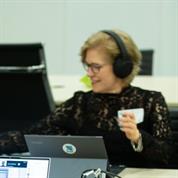Marion Lawie FRSA responds to the RSA ANZ blogging challenge, hosted in collaboration with 92Y as part of the Seven Days of Genius Festival - a global festival celebrating the power of new ideas. Marion shares perspectives from the Australian philanthropy sector and suggests ways to combat giving fatigue.
Last year I walked in a cancer fundraiser, sponsored a cyclest, bought a ticket at a muscular dystrophy fundraiser and cupcakes for the RSPCA. I also had to politely decline someone knocking on my door for The Salvation Army, a telephone fundraiser for the Smith Family, and a street fundraiser who stopped me on Adelaide Street - and that was all just last week!
Do you ever feel like you have nothing left to give and wonder why fundraising can’t be consolidated? I give, but surely there would be significant savings in pooling all that fundraising resource and streamlining the distribution of it to worthy recipients?
I'm not suggesting a reinvention of the tax system, but instead am calling for creative thinking and digital platforms to respond to this issue.
The Australian Charities and Not For Profit Commission says a busy, diverse charity sector is healthy, with competition breeding innovation, localisation and efficiency just as it does in the private sector. There is evidence for this in the very existence of a fundraising coach who says there is no such thing as donor fatigue, just lazy fundraisers.
But there is evidence of donor fatigue, charity fatigue, giving fatigue and compassion fatigue as we’re bombarded with images of need, natural disasters happen more frequently and destructively, and new diseases are discovered. Super rich philanthropists assign their giving through their wealth managers and middle- and low-income earners give less and less. There’s also evidence that, at least in Australia, we’re trusting charities less, with concerns over how donations are spent and frustration with being pestered to give.
There are 54,000 registered charities in Australia, one registered charity for every 440 people. That seems an awful lot, at least until you compare it with 1:268 in the United States and 1:270 in New Zealand. Anybody can start an online fundraiser, with dozens of crowdfunding sites hosting appeals from thousands of charitable causes and businesses too. World Vision CEO Tim Costello puts the number of Australian charities at 65,000+ and says there’s a definite case of charity fatigue that could be addressed through at least collaboration if not consolidation.
As a community engagement practitioner, I tend to think collaboration is the answer to everything. Combine it with creative thinking and perhaps we can come up with an answer for this too.
Creative thinking, design lead thinking, is bringing communities together using the very tools that many fear are dividing us. Digital communications – social media, mobile devices, the web – have made global communities of interest and practice. They are also connecting local people, counteracting issues of time poverty and bewilderment that can be read as neglect and exclusion. There are also platforms connecting people one-to-one in acts of charity.
Futuregov created the Casserole Club in the UK, a kind of distributed meals on wheels service where the cooks prepare food in their own homes and deliver it to elderly neighbourhood residents. It may have started with a spreadsheet but it’s become a sophisticated micro volunteering platform that’s helping keep people in their homes longer (great for the economy at large) but perhaps most importantly is connecting people.
In a similar vein, The Stop’s garden match making service in Toronto connects would-be gardeners with yard-owners in the neighbourhood. Beyond tidy gardens, home grown flowers and veg, and the physical and mental health boosts from working outdoors, are the social benefits as once strangers connect over a tomato glut.
This is the kind of giving you can do without having to beg your friends to sponsor your fun run or spend all your Saturday morning in a community centre.
Now, how do we do that on a global scale? Can I sponsor a genius cancer researcher to just go to work every day, instead of joining a fun run? But then where’s the fun it that!
Marion Lawie is a teacher by trade, long time public servant, and now an engagement practitioner. She has lived and worked in diverse communities, from outback Australia to Moscow. Now based in Brisbane, she provides strategic communication and engagement advice for significant projects. Marion is also an RSA Connector for Brisbane.

Be the first to write a comment
Comments
Please login to post a comment or reply
Don't have an account? Click here to register.